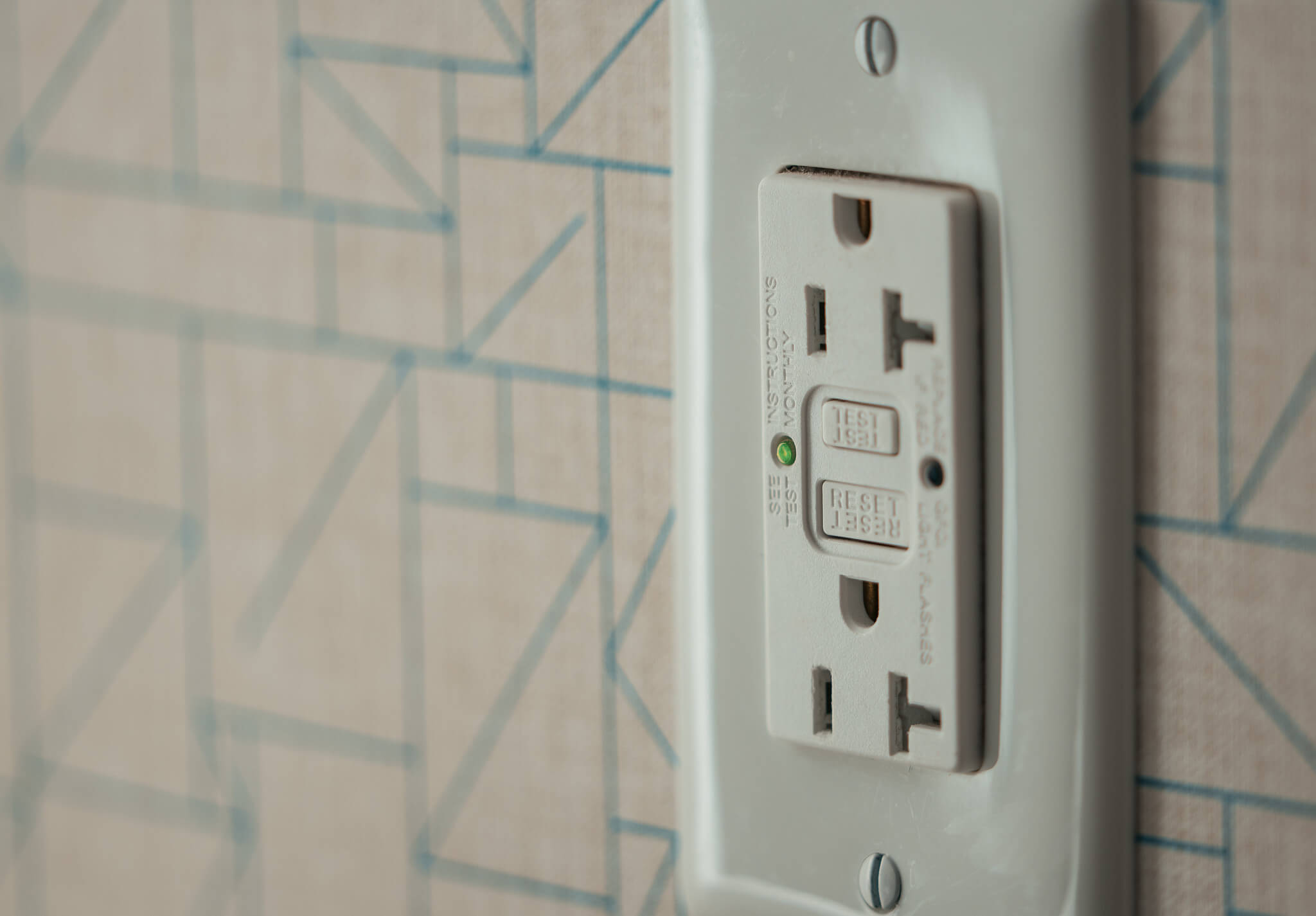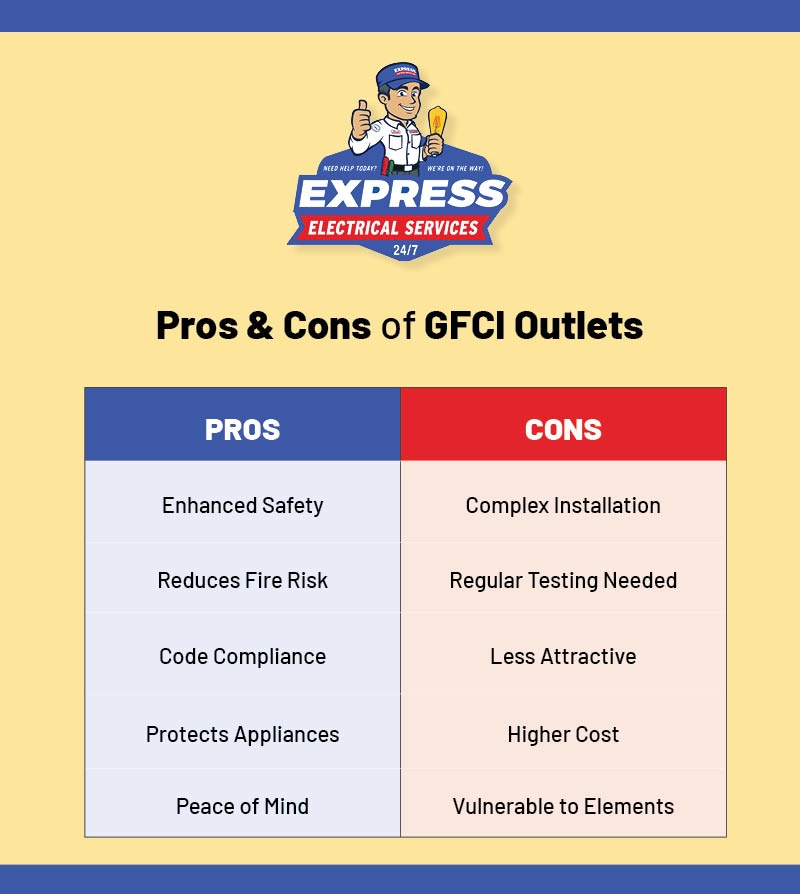Pros and Cons of GFI Outlets

Access to electricity is so commonplace that it’s easy to forget it’s a powerful force requiring safety measures like GFCI outlets to prevent injury from electrical shock.
Ground fault circuit interrupters (GFCIs) are special outlets required in all single-phase 125-volt outlets, a rule first introduced in the 1970s. The Electrical Safety Foundation International (ESFI) has revealed an 83% decrease in electrocutions since then, and the National Electric Code now requires GFI outlets in all homes, especially in damp spaces or anywhere near a water source, like kitchens, bathrooms, garages, and outdoor areas.
Read on to learn more about GFCI outlets, the top GFCI pros and cons, and why Express Electrical is the premiere electrical service provider throughout our service area, which spans the Los Angeles, Orange, Riverside, Ventura, and San Bernardino Counties.
The Pros of GFCI Outlets: Safety First
GFCI outlets offer several advantages to homeowners.
1. Meeting safety standards
The purpose of a GFCI outlet is to monitor the flow of electricity. Its sensor detects any current that flows through an incorrect path, like when a plugged-in electrical device comes in contact with water. The instant the outlet senses any changes in electrical current, it cuts power to that line. Installing GFI outlets helps prevent dangerous shocks, injury, and electrocution.
2. Avoiding electrical fires
Leaking electrical currents are a common cause of electrical fires, which often result in devastating damage and losses. They can occur due to old wiring or deteriorated insulation. The ESFI estimates there are 51,000 electrical fires every year, and by installing GFCI outlets, you can lower your risk by 80%.
3. Building code compliance
The local California electrical code is regularly updated to improve safety and often adds more GFCI requirements, such as the 2022 rules around GFIs in service bays, accessory buildings, kitchen areas, and outdoor outlets. Have your GFCI outlets installed by a licensed electrician to ensure your home is up to code and safe.
4. Avoiding property damage
Spikes in electricity negatively affect appliances and shorten their life. A GFI outlet prevents this by delivering a steady amount of power to appliances and back to the outlet. If there’s a small electricity leak, the outlet will trip, cut the power and stop any damage from occurring.
5. Peace of mind
You’ll relax knowing your home’s energy flow is consistently monitored by a safety device. For example, wash the dishes as you cook without worrying about a ground fault disaster in the kitchen. GFCIs trip and turn the power off at the first sign of any disturbance, including appliance malfunctions, wiring problems, moisture in the outlet, or even a lightning strike or electrical surge due to a static buildup.

GFCI Outlets: The Drawbacks
GFCI outlets also come with some disadvantages.
1. Complicated installation process
GFCI installation isn’t an average DIY project. It’s safer to have a licensed electrician install the outlets because:
- Two slot outlets with older wiring must be professionally replaced before installing a GFCI.
- A complicated outlet with five wires means it’s located in the middle of the electrical circuit and must be connected in a specific way.
Using a professional for installation makes the job more extensive than a simple swap-out.
2. They must be tested regularly
Once you have your GFCI installed, experts recommend monthly tests, with additional testing after power surges in the home. To test the outlet, push the TEST button. The power should turn off to the receptacle. Press the reset button to restore power. This is the same process as restoring electricity after the GFI shuts off due to static electricity or if lightning is nearby. This is likely the smallest of the GFCI outlet’s drawbacks, but it’s another chore to add to your household to-do list.
3. They’re not aesthetically pleasing
Not everybody likes the industrial look of an average GFCI outlet. The bright red buttons don’t often fit into home design schemes. Some homeowners opt for elaborate covers or “pop-up” models to disguise the outlet, while others may order expensive customized models to match their decor.
4. They’re more expensive than regular outlets
One of the biggest GFCI cons is the installation expense. You’ll need to pay to have an electrician install it, and the outlet itself also costs more than an average outlet.
5. They can go bad
GFCI plugs are vulnerable to UV light, moisture, and excessive heat, which causes them to trip unnecessarily or stop working. GFI outlets placed outside are the most vulnerable because they’re exposed to elements like California heatwaves, rainwater, condensation, and spray from lawn sprinklers.
Sometimes, a ground fault circuit interrupter is triggered by non-electrical occurrences, like dust in the outlet, or it may degrade over time.
GFCI vs. Regular Outlets: A Quick Comparison
GFCI outlets are designed with safety in mind. Here are the main differences between regular and GFCI outlets:
- Location – GFCIs must be in bathrooms, kitchens, and anywhere moisture-prone, including bars, outdoor areas, garages, and sinks.
- Appearance – GFCI outlets have TEST and RESET buttons, and standard outlets are smaller than GFCIs.
- Function – Standard outlets supply power, while GFCIs monitor current and shut down the power if there’s any irregularity.
GFCI vs. AFCI: Understanding the Distinction
A GFCI protects from ground faults, while an AFCI protects against arc faults and fires.
- A ground fault occurs when electricity takes an inadvertent path to the ground, causing a current surge. This can damage appliances and cause dangerous electrical shocks.
- An arc fault occurs when electricity sparks, jumps, or arcs between two contact points. It often happens when wiring is loose, corroded, or faulty. The arcing electricity produces high heat and may cause a fire.
GFCIs and AFCIs act quickly to shut down the electrical circuit and are important electrical safety devices in your home.
Alternatives to GFCI Outlets
GFCI outlets and circuit breakers are mandatory in new California homes, but older homes may have a GFI outlet. These devices are usually limited to one outlet or receptacle and function the same way as a GFCI, disconnecting the power in the event of an abnormal electrical current.
Both outlet options help keep you safe as long as they’re in good working order. For additional safety, consider using a combination GFCI/AFCI outlet.
Call Express Electrical to Install and Service Your GFCI Outlets
At Express Electrical, our electrical contractors in Los Angeles are experienced in installing and servicing GFI outlets. Available 24/7, our factory-trained technicians can respond to calls in 60-90 minutes. Contact us if you notice any electrical issues or a lack of GFI outlets in your home.
